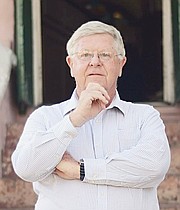By DR MIKE NEVILLE
“Gambling: The sure way to get nothing for something,” Wilson Mizner.
IN the wake of widespread acceptance of legal gambling in The Bahamas many of you may be surprised that it is also viewed as a potential addiction by psychiatrists.
The symptoms of the addiction are similar to other addictions with secretiveness, difficulties in stopping, family concerns and gambling when you cannot afford to; these can then lead to depression and even suicide.
Gambling has been around for a very long time with most modern casino games originating in Europe and China. My own experiences growing up in an Irish family with cousins who owned and trained racehorses was the enjoyment of visits to the races watching both horses and Greyhounds fly around the track. I was fascinated by probability theory and worked on variants of the Martingale which is a sequence of random variables. I was interested in roulette with the even chance of red or black falling required an exponential growth of bets which without unlimited funds would eventually make me bankrupt. The odds were further skewed by the zero which changed the fifty/fifty chance the statistical basis for the Martingale. I then realised when I visited a casino and saw zero, double zero and triple zero on the roulette wheel, the real odds were never fair to the punter. I learnt the bank always wins so decided gambling was not for me.
Even at medical school in Dublin gambling seemed fun, one fellow student purchased some mice from the pet store and small bets were placed to see which mouse crossed a finish line first on a table in the bar that we frequented. It all came to an amusing end when an enterprising student captured a wild mouse and entered him in the race, the mouse did not race, he leapt in the air and shot around the bar vanishing under tables and upsetting all the customers, the landlord was not amused and that ended that form of gambling!
It was around that time that I became aware of the dark side of gambling when I would see people hanging around the betting shops, looking anxious, agitated and broke; there was clearly no hope of their wages going home to feed their families.
Gambling in The Bahamas has had an interesting history beginning with small gambling clubs catering to high end visitors; this practice culminated in the 1967 Commission of Inquiry into gambling. It is an interesting read with the ubiquitous “consultants” and letters from the Christian Council and the Catholic bishop warning of the potential moral abyss that opening up gambling could create. The resulting recommendations created a compromise which legitimised gambling but did not allow Bahamian citizens or residents to gamble. There was also a ban on Bahamians working as croupiers in the casinos, these were well paid jobs and created a scenario that eventually led to bad feelings all around. The illegal gambling in the form of “numbers” continued to thrive making the law seem somewhat irrelevant.
The recent gambling referendum created a similar impasse; the churches again warned of the moral abyss and in fact won the “no” vote. This time there was to be no compromise and gambling is booming. There has been little talk of the inevitable casualties of gambling addiction and whilst many therapists have experience in treating other addictions there is a paucity of treatment options for this specific addiction.
It would have been nice if recognition of the importance of mental health had led to the formation of a unit that could have researched the size of this growing problem and provided treatment. I suppose it was just like the “magical thinking” of the gambling addict that made me think this could have been funded by the millions and millions of money created by this surge in gambling.
• Dr Mike Neville is a forensic psychiatrist who has practised for more than 40 years in The Bahamas, working at Sandilands, the prison and in private practice. Comments and responses to mneville@tribunemedia.net





Comments
Well_mudda_take_sic 8 years, 7 months ago
An excellent article. Mention should have been made of Pfizer's recently developed treatment kit for compulsive gambling disorders which in lab trials has proven itself to have a near 100% cure success rate. In the kit is a revolver with one bullet loaded in the six-bullet chamber. The instructions require the compulsive gambler to once a day spin the revolver's chamber, place the revolver to the temple of the head and then pull the trigger. Seldom does the compulsive gambler have the urge to continue gambling after 6 days of following this self-treatment program developed and sponsored by Pfizer, a leading pharmaceutical company.
Sign in to comment
OpenID